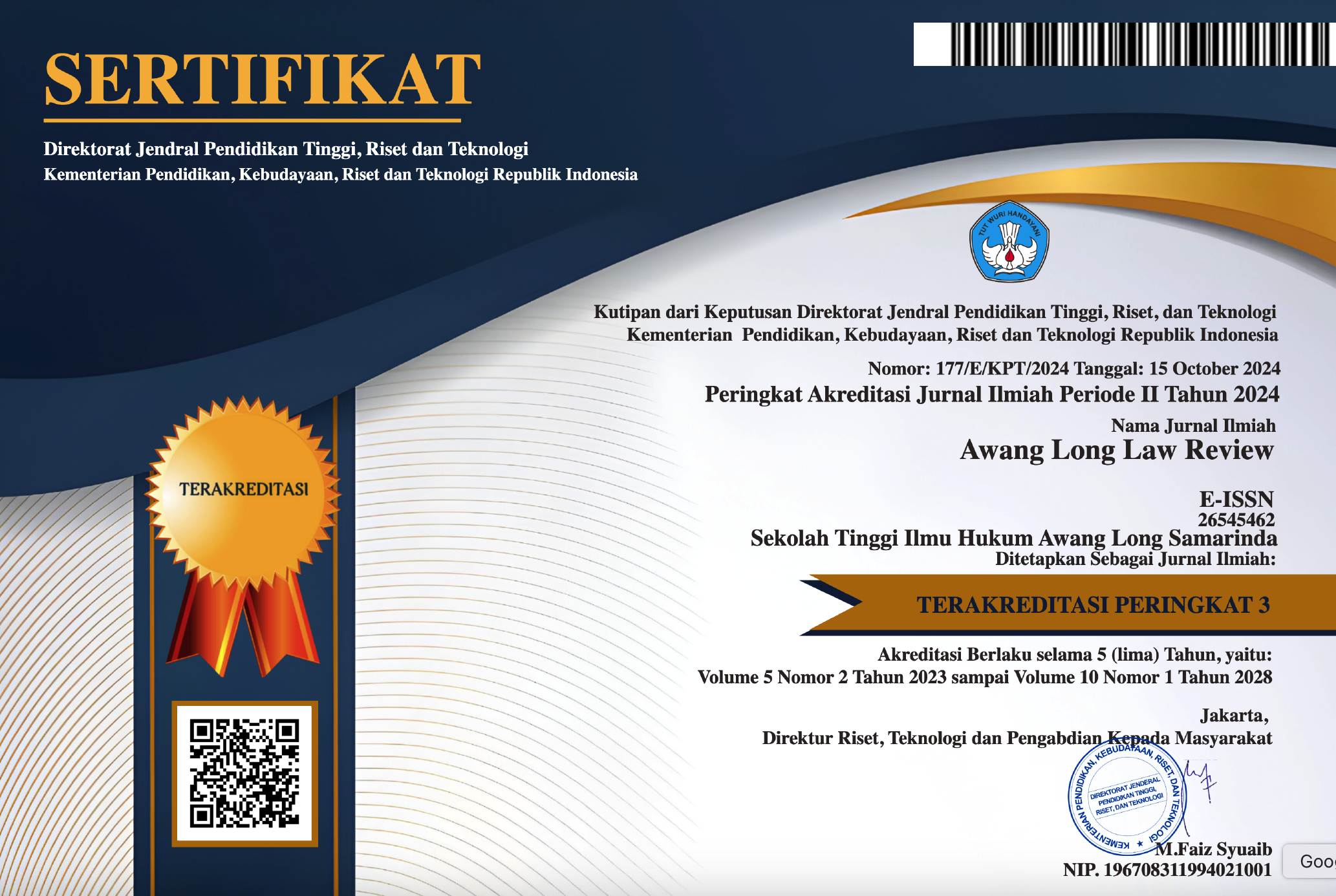LEGAL CERTAINTY OF THE IMPLEMENTATION OF FIXED-TIME EMPLOYMENT AGREEMENTS AFTER THE LABOR CREATION ACT OF 2023
Abstract
This study aims to analyze legal certainty in the implementation of Fixed-Term Employment Agreements (PKWT) following the enactment of Law Number 6 of 2023 concerning the Stipulation of Government Regulation in Lieu of Law Number 2 of 2022 concerning Job Creation into Law. This regulation brings significant changes to the provisions of PKWT, previously stipulated in Law Number 13 of 2003 concerning Manpower. Using a normative legal approach, this study examines the paradigm shift from a system that primarily protects workers to one that is more flexible and oriented toward business interests. The results indicate that although the Job Creation Law provides greater flexibility for employers and adds new forms of protection in the form of compensation and electronic registration, the elimination of contract time limits and the provision for automatic conversion of PKWT to PKWTT reduces legal certainty for workers. To achieve a balance between employer interests and the protection of workers' rights, strengthening derivative regulations, increasing labor oversight, and providing legal education for all parties is necessary to ensure that the implementation of PKWT is carried out in accordance with the principles of justice and legal certainty in Indonesia's rule of law.
Downloads
References
Bambang, R. J. (2020).Employment Law.Bandung: Loyal Library.
Book, W. (2022). Indonesia Economic Prospects: Boosting the Recovery. Washington DC: World Bank.
Dalimunthe, N., & Fajri, M. (2023). Analysis of the Status of Freelance Workers in Fixed-Term Employment Agreements (PKWT) from the Perspective of Employment Law in Indonesia.Journal of Islamic Law and Humanities, 2(3).
Fahmi, M. A. (2021). Implementation of Fixed-Term Employment Agreements (PKWT) at PT. Indocare Pacific Lombok Branch Based on Law Number 11 of 2020 concerning Job Creation.Journal of Private Law, 3(2).
Harahap, A. M. (No Year).Introduction to Employment Law.Batu: Nusantara Literacy.
Hernawan, A. (2021). Principles of Labor Law and Their Development in Indonesia.Journal of Law Jus Quia Iustum, 28(1).
Irianto, S. (2020). Qualitative Research Methods in Legal Science Research Methodology.Journal of Law & Development, 32(2).
Jibran, M. N., Nurdin, & Rizkianto, K. (2024). Protection of Workers' Rights and Obligations as Seen from Law Number 6 of 2023 concerning Job Creation.Journal of Indonesian Islamic Studies, 2(1).
Kartasapoetra. (1992).Labor Law in Indonesia is Based on Pancasila.Jakarta: Sinar Grafika.
Ministry of Research, Technology and Higher Education. (2022).2021 National Innovation Performance Report.Jakarta: Ministry of Research, Technology and Higher Education.
Kusuma, A. J., Ratna, E., & Irawati. (2020). Legal Status of PKWT Workers Who Do Not Comply with the Provisions of the Manpower Law.Jurnal Notarius, 13(1).
M. Y Purba, Wijayanti, A., & Nadapdap, B. (2024). Legal Protection for Workers in Fixed-Term Employment Agreements (PKWT) Reviewed from Law No. 6 of 2023.Collaborative Journal of Science, 7(4).
Mahardika, R., & Rumainur. (2023). Protection of the Rights of PKWT Workers in Termination of Employment Based on Provisions of Employment Law.Ethics and Law Journal: Business and Notary (ELJBN), 1(2).
Manalu, E. P. (2022). Changes in the Legal Status of Employment Agreements Following the Enactment of Government Regulation in Lieu of Law Number 2 of 2022 Concerning Job Creation.Prioris Law Journal, 10(1).
Nasution, H. (2023). Job Insecurity and Workers' Mental Health: A Case Study Post-Job Creation Law.Indonesian Journal of Public Health, 18(1).
Nurdin, E., Susanti, E., & Utomo, S. (2025). Legal Protection for Workers with Unwritten Employment Agreements by the Manpower and Transmigration Office of East Kalimantan Province.Lex Generalis Law Journal, 6(5).
Octavia, C., & Lie, G. (2023). Legal Review of PKWT Workers Who Are Employed Continuously.Sigli Social Humanities Journal, 6(2).
OECD. (2023). OECD Economic Surveys: Indonesia 2023. Paris: OECD Publishing.
Pangaribuan, J. (2021). New Employment Law Policy in Indonesia: An Analysis of the Job Creation Law.Journal of Law & Development, 51(1).
Prana, S. A., & Pura, M. H. (2022). Protection and Legal Certainty for Workers with Fixed-Term Employment Agreements (PKWT) Post-Law Number 11 of 2020 concerning Job Creation.Justitia: Journal of Law and Humanities, 9(7).
RI, K. K. (2022). 2021 Annual Employment Report.Jakarta: Ministry of Manpower.
Serrao, A. C., & Hamzah, A. S. (2025). Legal Certainty for PKWT Workers After the Enactment of Law Number 6 of 2023 Concerning the Stipulation of Government Regulation in Lieu of Law Number 2 of 2022 Concerning Job Creation into Law.Private Law Journal, Faculty of Law, University of Mataram, 5(3).
Shalihah, F. (2017). Fixed-Term Employment Agreements (PKWT) in Employment Relations According to Indonesian Labor Law from a Human Rights Perspective.Uir Law Review, 1(2).
Soerodjo C. Arifin, Borman, & Shidarta. (2022). Legal Status of Outsourcing Workers Before and After the Enactment of Law Number 6 of 2023 concerning Job Creation.Journal of Legal Research, 2(4).
Suwondo, C. (2022). The Impact of Changes in PKWT Regulations on Worker Career Development.Journal of Human Resource Management, 16(2).
Tambunan, T. (2021). Indonesian SMEs in the Era of Disruption: Competitiveness and Policy Analysis.Journal of Economics and Public Policy, 12(1).
Tjandraningsih, I. (2021). Work Flexibility and Wages in the Digital Era: Challenges and Opportunities.Journal of Social Analysis, 25(1).
Udiana, I. M. (2016).Position and Authority of the Industrial Relations Court.Denpasar: Udayana University Press.
Uwiyono, A. (2021). Fundamentals of Labor Law.Jakarta: Rajawali Press.
Wijayanti, A. (2021). Reform of Fixed-Term Employment Agreement Regulations Following the Constitutional Court Decision.Constitutional Journal, 18(1).
Copyright (c) 2025 Gatot Subroto Widagdo

This work is licensed under a Creative Commons Attribution-ShareAlike 4.0 International License.







